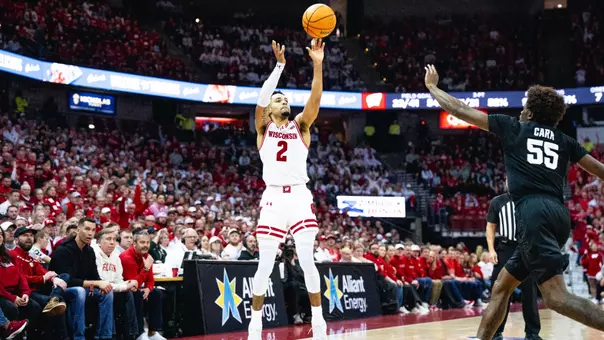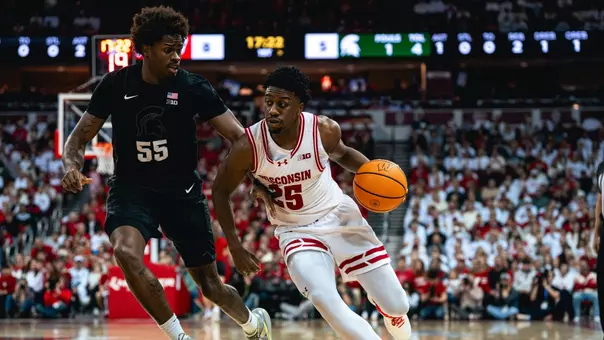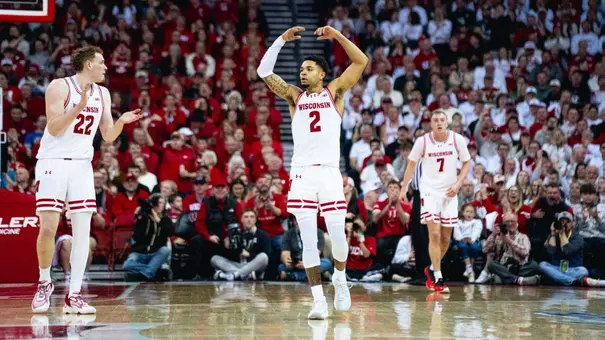On Campus: Rashard Griffith’s promise
January 18, 2017 | Men's Basketball, Mike Lucas
Former UW basketball big man returns to earn degree after pro career
 |
||
|
BY MIKE LUCAS
UWBadgers.com Senior Writer
MADISON, Wis. — For nearly two decades on foreign soil, Rashard Griffith's classroom was the low block and paint, a universal battleground that translated the same in Turkey, Israel, Italy, Spain and Romania. It turned out to be an ambitious journey and education for the last Wisconsin player to average a double-double.
While living up to his own promise in Europe by collecting titles and handsome paychecks from Tofas Bursa, Maccabi Tel Aviv, Kinder Bologna, TAU Ceramica, Lottomatica Roma, Tenerife, CB Calpe, Pinar Karsiyak and CSU Asesoft Ploiesti, there was another promise, an unfulfilled one.
"I promised my mother," he said, evoking the memory of Elaine, the hardscrabble Chicago Transit Authority bus driver, "that I would come back and get my degree when my career was over with, and that's what I'm doing; I'm keeping my promise to her and I'm doing it for myself, too."
Twenty-two years after leaving school to enter the NBA draft — following his sophomore season in 1994-95 during which he averaged 17 points and 11 rebounds — Griffith is returning to the Madison campus with the intent of taking care of unfinished academic business, however long it may take.

By doing so, he's following the lead of a former UW teammate, Michael Finley, who came back and got his degree in 2014. Finley was 41 at the time. Griffith is 42. "We had talked about it," Griffith recounted of their off-season discussions. "Mike said he was going to do it. I said I was going to do it."
Finley was closer to the finish line after spending four years at Wisconsin before embarking on a rewarding NBA career that lasted 16 seasons. Nonetheless, with the second semester getting under way this week, Griffith is keeping his word by taking a few classes; a modest but meaningful starting point. The UW Athletic department has a policy in place to cover the cost of tuition, fees and books for any scholarship student-athlete who wishes to return to fulfill their undergraduate degree requirements.
"I just want to get my feet wet again and get adjusted to everything," said Griffith, who was advised to approach the challenge in measured steps to ensure that he wouldn't be biting off more credits than he could chew. "Hopefully, in the fall, I'll take a bigger load."
Besides Finley, the second-leading scorer in school history, there have been others in the basketball family that have preceded Griffith on this path, including Danny Jones, the Badgers' third-leading career scorer. He was 41 when he came back in 2010 to complete his undergraduate work.
"I thought about doing it online when I was still playing," said Griffith. "But I talked to a few people — like Mike (Finley) and coach (Barry) Alvarez (the UW director of athletics) — and they told me, 'Come back here and get your degree, you're a Badger. Get it from Wisconsin.'"
Griffith has additional inspiration in first-year UW men's hockey coach Tony Granato whose hiring was contingent on Granato completing his degree requirements. The 52-year-old Granato can share his first semester classroom experiences with Griffith, who has many supporters in his corner.
"I just want to be there for him," said UW assistant basketball coach Howard Moore, a friend and former Badger teammate. "I want to help him understand we have a lot of people who support him, are proud of him and are willing to do whatever they need to do to get this off to the right start."
Griffith is living with Moore and his family. "Uncle Rashard has been a babysitter to our kids as he has been getting re-acclimated to Madison," said Moore, who went to Taft High School in Chicago; Griffith is from King. "He has the right mindset because he wants to do this (get his degree).
"He understands what he needs to do — take it slow, work your way back into it. Obviously, we're a little older now. But our distractions are a lot more limited. We're not young and trying to figure out what life is all about. He's a lot more focused and driven to get this done."
At 7-foot, 280-plus pounds, Griffith was never intimidated on the court. But does he have any anxiety about going back to the classroom? "Yeah, math, it was never my strongest suit," he said with a hearty laugh. "Seriously, I look at it as it's going to be fun and you're never too old to learn.
"I know I haven't been in school since '95. But I think I'm ready and it will be easier from the aspect of not having to worry about practice and all the things that go along with playing (travel, pressure, injuries, etc.). Plus, I've got more help (tutors) than when I was here before."

As a freshman, Griffith teamed with Finley and Tracy Webster to lead the Badgers to their first appearance in the NCAA tournament in 47 years. Griffith had 22 points and 15 rebounds in an opening win over Cincinnati. Missouri ended their dream with a 109-96 victory in the second round.
Griffith has never second-guessed his decision to leave after his sophomore year. He played one season for Stu Jackson, who left for the NBA; and one season for Stan Van Gundy, who was not retained. And, in truth, he didn't see himself as a fit for Dick Bennett's system though he liked him personally.
Griffith, thus, entered the 1995 NBA draft and was a second-round pick (No. 38) of the Milwaukee Bucks. Maryland's Joe Smith was No. 1 overall and Chicago Farragut High School's Kevin Garnett was No. 5. The Phoenix Suns selected Finley with the No. 21 pick in the first round.
"I would tell any kid the same thing if they're thinking about leaving early," Griffith said. "I would never stop them from going out and trying to make money. But while you're young, and it's still in you, I would say when you get a chance, knock some of it out (progress towards a degree)."
The Bucks, notably Mike Dunleavy, the coach and general manager, felt like Griffith needed more seasoning and encouraged him to play in Europe. The expectation was that Griffith would sharpen his skills and eventually return to the states and contribute to Milwaukee's success on the frontline.
But Griffith rewrote that script by exceeding most expectations during a banner first season for Tofas Bursa. "I'm still the youngest player to win the MVP in Turkey history," said Griffith. "Mike Dunleavy later told me, 'We didn't expect you to go over there and do what you did.'"
Nor were the Bucks willing to come up with the bucks for Griffith.
"It was never that I couldn't play (in the NBA)," Griffith said. "It was the fact I was making good money over there and we could never meet halfway (on a contract). I understand it's a business. The only reason that I didn't come back was the financial part of it — not whether I could compete or not."
In retrospect, Griffith confided that first year overseas was the most challenging.
"My father was over there (Turkey) with me," Griffith said, "and he kept telling me, 'You're getting great money to do the thing that you love. How many people get a chance to do that every day? Trust me, I know, I was punching the clock from 9 to 5, doing something you don't want to be doing.'"
Griffith took the words of his late father to heart. He played 17 consecutive seasons in Europe, including a memorable Euroleague championship run in 2000-2001 on a Kinder Bologna team that was a stepping stone for Manu Ginobili and Marko Jaric. Griffith was the Italian Cup MVP that season.
"How many games did I play?" Griffith said. "I didn't count games, I just went out and played — 17 straight years, practice twice a day, two games a week. Every year, I was finishing in late June and I had to be back in training camp in August getting ready for the season in September and October."
At his last stop in Romania, it was during the league playoffs when Griffith felt his Achilles pop. "That was the most significant injury that I had," he said. "I had surgery and I did my rehab and I was planning on going back to Romania, when my body was telling me, 'I'm tired, I'm done.'"
Griffith retired from basketball in 2010. Before deciding to return to get his degree, he was training and mentoring young grammar school athletes in Chicago. "I wanted to help them understand that it starts now," he said. "You need to start now with the things that prepare you for life."
It's never too late, either. As he's proving.
"When I'm talking to kids, I'm always talking to them about the degree," said Griffith, whose focus is not on the grind but the reward, a college diploma nobody thought he would ever get. "When I do this, and I talk to them, I'll have it to back me up. It will be, 'Ok, I've got mine. Now, you get yours.'
"Like I said, I think it will be easier than when I was 17 and 18. I can use my life experiences. For me, now, every day you wake up, it's a new day for you to learn something and prove yourself. You have a purpose. And the purpose for me will be going to class, getting my degree and leading by example."













